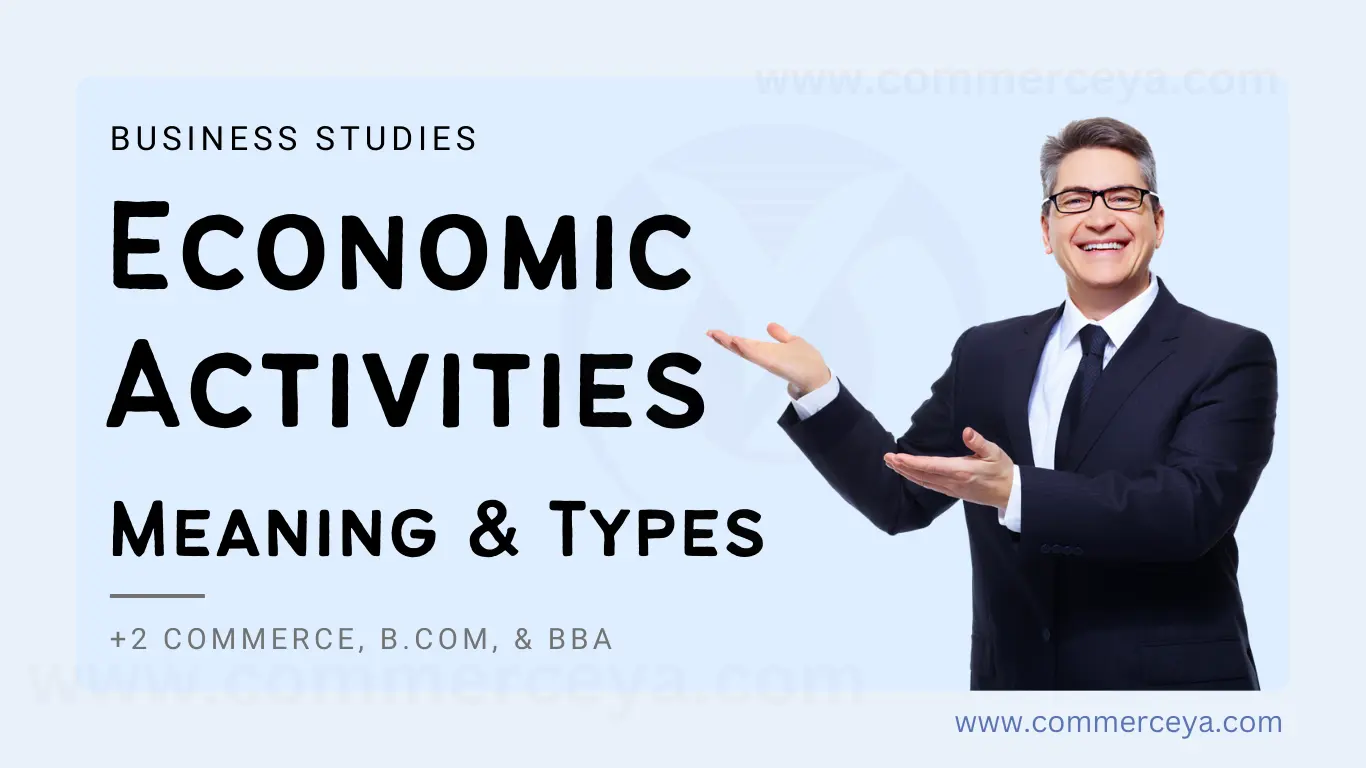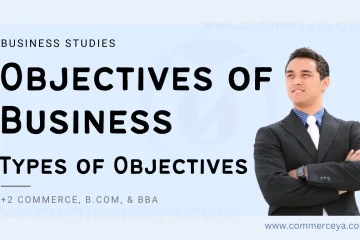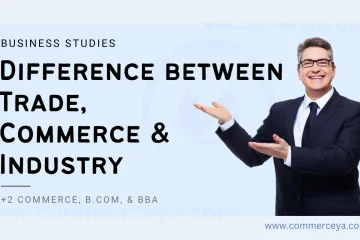Economic activities: Meaning
Economic activities refer to those activities that are undertaken to earn money or earn a living. For example, a worker working in a factory, a farmer attending to agriculture work, or a doctor attending to patients—all these activities are undertaken to earn a living.
Economic activities are concerned with the production, exchange, and consumption of goods and services that are not available free of cost.
Types of Economic activities
Economic activities can be categorized in three ways:
- Business: production and exchange of goods and services to yield profits
- Profession: providing personal services to earn a fee
- Employment: performing service as per the agreement of employment to get a salary
Concept of Business
Business means keeping busy with economic activities. These activities aim to earn profit. The activities not connected with earning profit are not part of the business. For example, watching television and playing a computer game are not undertaken to earn a profit, so neither of these are part of business.
Definition of Business
According to L.H. Haney, “Business may be defined as human activities directed towards providing or acquiring wealth through buying and selling goods”.
According to Peterson and Plowman, “Business may be defined as an activity in which different persons exchange something of value, whether goods or services or mutual gain or profit.”
According to Wheeler, “An institution organized and operated to provide goods and services to society under the incentive of private gain”.
According to Vrwick and Hunt, “Business is any enterprise that makes, distributes, or provides any article or service that the other members of the community need and are able and willing to pay for.”
Discussing the definitions, business can be stated as:
Business refers to all those activities that are concerned with the production, purchase, and sale of goods and services to earn profit. The earning of profit is the reward for undertaking business activities. So business is the sum total of all those activities connected with manufacturing, trading, transport, banking, insurance, warehousing, advertising, etc. that are undertaken to earn profit.
Characteristics of Business
The following are the main characteristics of a business:
- Economic activity
- Production or procurement of goods and services
- Sale or exchange of goods and services for the satisfaction of human needs
- Dealing with goods and services regularly
- Profit earning
- Uncertainty or return
- Element of risk
- Economic activity: Business is an economic activity that is undertaken with the object of earning money or livelihood and not because of love, affection, sympathy, or psychological satisfaction.
- Production or procurement of goods and services: A business either produces or procures goods and services to offer them to customers. The goods can be consumers’ goods or producers’ goods. Consumer goods may be for immediate consumption, like foodstuffs, or for the future, like clothes, furniture, etc. Producers’ goods are used for further production of goods like machinery, raw materials, etc. The services may be in the form of banking, insurance, warehousing, transportation, etc.
- Sale or exchange of goods and services for the satisfaction of human needs: Business involves the sale or exchange of goods and services. The sale or exchange for a price is the basic feature of business. The purchase of goods or services for self-consumption is not business. The sale or exchange should be to earn profit; only then will it be a business. A housewife cooking food at home for consumption is not business, but cooking food at a restaurant and selling it to others for profit is business.
- Dealing with goods and services regularly: Dealing with goods and services becomes business only if undertaken regularly. An isolated transaction does not become a business. The sale of an old car to buy a new one is not business, even if the old car is sold at a profit. If a person deals in the purchase and sale of cars for profit, it will be called a business.
- Profit earning: The main purpose of a business activity is to earn profits. The hope of earning profits brings people into the business. No business can survive for long without earning profits. This is why a businessman makes all-out efforts to earn more and more profit by increasing the volume of sales or by reducing costs.
- Uncertainty of return: An important feature of business is the uncertainty of return on investments made. It is not possible to predict how much profit a businessman can earn. There is no certainty that there would be profits as well. There may be losses despite the best efforts of the businessman.
- Element of risk: An element of risk is prevalent in business. Risk implies the uncertainty of reward or the possibility of loss. Uncertainty is present in every economic activity, but it is more prevalent in business. The factors on which business depends are never certain. There may be a shift in demand, strikes by employees, floods, accidents, fire, economic changes, etc. Though a businessman tries to forecast future possibilities, things may not happen in the same way. The risk element keeps a businessman vigilant.
Concept of Profession
Profession refers to economic activities where individuals apply specialized knowledge and skills to earn fees. A person can enter a profession only after acquiring certain skills and knowledge prescribed for it. So, a profession is an occupation involving rendering personal service of a specialized nature for a fee.
Characteristics and Features of a Profession
Different characteristics of profession can be listed as follows:
- Specialized knowledge and training
- Compulsory membership of a body
- Code of conduct
- Professional fee
- Professionals cannot advertise
- Specialized knowledge and training: A person entering a profession should have specialized knowledge and training prescribed for entering that profession. One must have a professional degree and/or training to enter a particular profession. A person not possessing the prescribed degree cannot enter the profession.
- Compulsory membership of a body: Different professions have their own professional bodies that prescribe the qualifications for acquiring the membership of that body and also regulate the working of the members. There is a Medical Council of India for doctors, a Bar Council of India for advocates, the Institute of Chartered Accountants of India for accounting professionals, etc.
- Code of conduct: Every professional body prescribes a code of conduct for its members. The code of conduct includes rules and regulations concerned with the profession, integrity, honesty, norms of behavior, etc. All the members are required to follow the code of conduct.
- Professional fee: A professional charges a fee for providing his services. Economic considerations should not take precedence over services. A doctor will give preference to serving the patient rather than the fee.
- Professionals cannot advertise: There is a bar on advertising the professions to get clients. Professional bodies do not allow any type of advertisement for acquiring business or clients. The services rendered by a doctor, an advocate, or a chartered accountant fall under the profession.
Concept of Employment
Employment refers to an occupation in which people work for others and get paid in the form of salaries or wages. The service is provided under an employment agreement. The persons who work for others are known as employees, such as managers, assistants, clerks, peons, workers, etc., and the person who provides employment is known as an employer. So, persons undertaking to render personal services under some agreement in return for salaries or wages are working under employment.
Characteristics and Features of Employment
Different characteristics of employment can be listed as follows:
- Personal services
- Employee-employer relationship
- Agreement
- No risk
- No capital investment
- Following service rules
- Personal services: Employment commences when a person joins some organization to provide personal services. The same person must perform the services, and no one else may do so in his place.
- Employee-employer relationship: Under employment, there is a relationship between employee and employer. The person who offers to work is called an employee, and the one who employs the person is called an employer.
- Agreement: Employment is created under an agreement. The agreement contains the terms and conditions of employment, nature of work, remuneration, etc.
- No risk: An employee gets remuneration for doing work. The employees are paid their remuneration, irrespective of profit or loss to the employer. There is no risk involved in employment because wages and salaries have to be paid.
- No capital investment: The persons working under the contract of employment are not required to invest any money in the business. The investments are made by the employer and not by employees.
- Following service rules: An employee is required to obey the service rules prescribed for his job. Any violation of service rules may cause an employee to face punishment.




